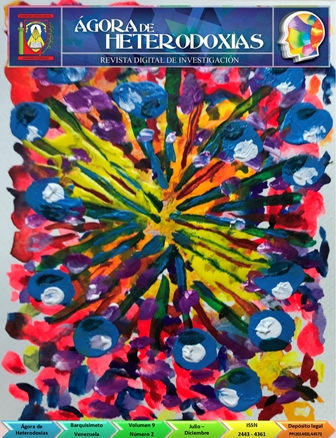Mente ecológica ¿Es posible desde la comunicación interciencias asumir un compromiso ecológico con el planeta?
DOI:
https://doi.org/10.5281/zenodo.8422180Palabras clave:
Mente ecológica, comunicación interciencias, Acción comunicativaResumen
Cuando comunicamos, ¿realmente estamos comunicándonos? La comunicación como medio para transmitir nuestras ideas, opiniones, estados de ánimo, emociones, entre otros mensajes, es una habilidad que desarrollamos como seres humanos a lo largo de toda nuestra vida. Y si bien es cierto nos estamos comunicando de manera constante por medio del lenguaje (verbal, corporal o escrito), no siempre esa comunicación es inteligente y efectiva, en consecuencia se crea una brecha entre lo que queremos expresar y la forma como le llega el mensaje a la otra u otras personas. En la comunicación de las ciencias, en este caso particular de las ciencias sociales, también se presentan brechas, y experimentamos múltiples desencuentros como desafíos a la pretensión del encuentro. La dirección en ese encuentro comunicacional con ese otro se ve impregnada de la necesidad de probar, justificar y a veces hacer inagotable la explicación para lograr la comprensión.
Descargas
Citas
Carvajal, B. (2007). Problemática Ambiental y Prospectiva. Uso de los métodos de planificación prospectiva ante las incertidumbres futuras en áreas rurales. Revista Estudios Iberoamericanos. 2 (1). / pp. 13-33.
Ernest, P. (1999). What is Social Constructivism in the psychology of mathematics education. Philosophy of Mathematics Education Journal, 12, pp. 42 – 67.
Popper, K. R. (2002) Conjectures and Refutations. The Growth of Scientific Knowledge. Routledge, United States.
Snow, C. P. (1995). As duas culturas e uma segunda leitura. Trad. Geraldo Gerson de Souza e Renato de Azevedo Resende Neto. São Paulo: EDUSP.
Vieira Ouriques, E. (2015). A teoria da gestão e a emancipação psicopolítica do sujeito do autocontrole contínuo e dos balanços anuais. Ágora de Heterodoxias, 1(2), 34-53. https://revistas.uclave.org/index.php/agora/article/view/257
Publicado
Cómo citar
Número
Sección

Está obra está bajo licencia Creative Commons Attribution-NonCommercial-ShareAlike 4.0 International License.
![]() Los autores mantienen los derechos para reutilizar el artículo para fines docentes y de investigación. Los lectores y usuarios pueden leer, descargar, copiar, distribuir, imprimir, buscar o usar sus publicaciones con cualquier propósito legal, sin ninguna barrera financiera, legal o técnica, además de las que son inherentes de las que implica acceder al Internet. Siempre y cuando preserven el derecho de los autores de ser adecuadamente reconocidos y citados Ágora de Heterodoxia no se hace responsable de la información suministrada por colaboradores, la cual no constituye, necesariamente, el punto de vista de la publicación.
Los autores mantienen los derechos para reutilizar el artículo para fines docentes y de investigación. Los lectores y usuarios pueden leer, descargar, copiar, distribuir, imprimir, buscar o usar sus publicaciones con cualquier propósito legal, sin ninguna barrera financiera, legal o técnica, además de las que son inherentes de las que implica acceder al Internet. Siempre y cuando preserven el derecho de los autores de ser adecuadamente reconocidos y citados Ágora de Heterodoxia no se hace responsable de la información suministrada por colaboradores, la cual no constituye, necesariamente, el punto de vista de la publicación.
Derechos del/de autor/es a partir del año de publicación
Esta obra está bajo la licencia:
Creative Commons Reconocimiento-NoComercial-CompartirIgual 4.0 Internacional (CC BY-NC-SA 4.0)




